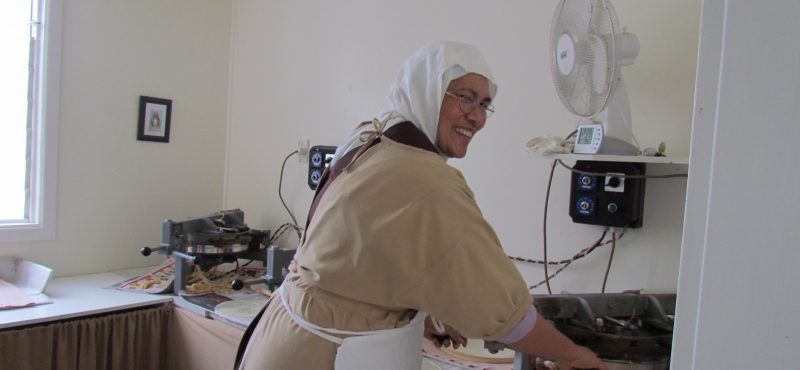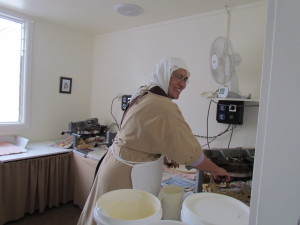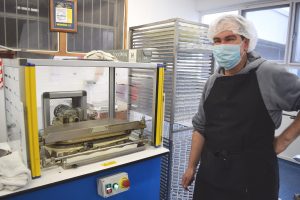by ROWENA OREJANA
The Carmelite nuns go about their work in silence. They mix the ingredients and pour the mixture into two heated circular iron machines to bake them into big circular plaques.
The plaques are put into a humidifier room to soften them so they are ready to be cut. When they are soft enough to cut without cracking, 80 plaques are stacked and go to the circular cutter. The bread, which will be transformed into the Body of Christ through the paschal mystery at Mass, is then sorted, weighed and packed.
Altar breads, although produced with the purpose of becoming holy, are sold in a somewhat limited New Zealand market.
The challenge facing the two producers in New Zealand, the Carmelite Sisters and the Society of St Vincent de Paul in Wellington, is expanding the customer base, particularly as some parishes switch to imported breads.
The Carmelite nuns have been making altar breads since they arrived in 1937, said Sr Mariam, the prioress.
“We’re still getting very good orders. It wouldn’t hurt if there were a bit more,” she said.
“We make what you call the ordinary kind. The breads are of high quality. Some people prefer our altar breads because they’re thicker and no crumbs and they’re shiny, high quality ones,” she added.
SVdP Wellington area communications and marketing development manager Elsbeth Hymes Hancock said, on the other hand, a preference for imported breads has affected their sales.
“Whenever a decision is made to buy products abroad as opposed to here in New Zealand, we lose out. Maintaining sales is important for us to be able to continue this special work of offering paid employment to individuals with intellectual disabilities,” she said.
SVdP employs New Zealanders with intellectual disability to bake the breads. They started more than 30 years ago and updated their equipment two years ago.
It is the major supplier of altar breads in New Zealand and has branched into making wholemeal as well as gluten-free breads. Gluten-free bread is dearer.
“By far the most in-demand items are the plain white, small altar breads. The larger sizes, wholemeal and gluten-free numbers are much smaller, but growing.”
Mrs Hymes Hancock said in the period from June 2013 to July 2014, their sales went up by 16 per cent. They fell the same amount from June to July 2014-2015.
Although the cost of production (flour, electricity and wages) has gone up, SVdP has kept the cost of the breads at 2005 levels.
SVdP is looking to expand its market share and venture overseas. “We are ready to supply large quantities to a much greater number of churches and are currently looking into entering the Pacific Islands market,” Mrs Hymes Hancock said.
Sr Mariam, on the other hand, said they make about 45,000 a week. It is the Carmelites’ sole means of income.
“I wouldn’t say that our sales have fallen to the point that we are in a crisis situation,” she said.
“We can’t bake altar breads for the whole of North Island. We just have no time. We do supply a good deal to the Auckland diocese. Also, I think we’re getting orders from Hamilton. And by way of charity, we send altar breads by packets to the Cook Islands. So that’s more or less our range of altar breads,” she said.
It was unclear whether some parishes import their altar breads directly.
The only other distributor of altar breads in New Zealand is Pleroma Christian Supplies.
Pleroma Christian Supplies started in 1978 and is a non-profit registered charitable trust and a recognised apostolate within the Church.
General manager Shirley Duthie said they have always sold altar or communion breads and their stock is imported from Italy.
“The demand for them dramatically increased in 2010. We responded by purchasing in much larger quantities, thus reducing the price,” she said.
Pleroma’s prices are the lowest in the market. They sell a jar of 35mm 1000 pieces at $34.99 while SVdP sells a pack of 30mm 1000 pieces of the same product for $50.
She said it could have been a reduction in the availability of locally produced bread that prompted the hike in demand.
“Our mission statement requires that we provide at the lowest cost and as promptly as possible, the materials required by those in the front line of evangelisation,” she said.
Mrs Duthie said they serve customers throughout New Zealand and Oceania. Their customers include other retail organisations such as diocesan Catholic shops, Catholic institutions, dioceses, parishes and individuals.
“Our communion bread is also popular with Anglican parishes,” she added.
Despite the competition, Mrs Duthie said there is no tension between the three suppliers.
“If there is a shortage, we would help each other out,” she said.
“We’re just there to serve the parishes and people of New Zealand. We’re not there to make money. We just have to stay solvent. That’s all we have to do,” she said.



Mauri
I am enquiring if altar bread machines can be purchased in New Zealand. The machine is for a parish in one of the islands in Kiribati.
Can you please advice where an automatic or semi automatic machine can be purchased and for how much?
Thank you
I have a near New German machine for sale if you are still interested contact me.